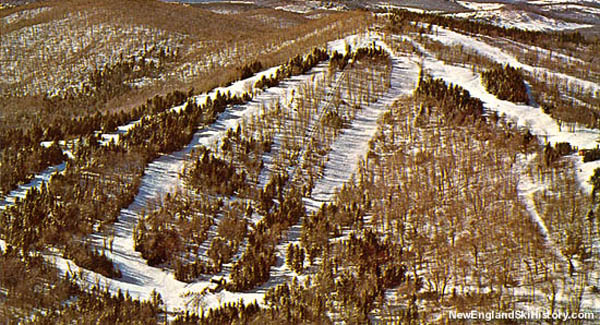
|
|
Located off of Vermont Route 9 on the eastern face of Mt. Olga, Hogback was once a popular regional ski area. After over two decades of closure, Hogback has seen a new life as a backcountry ski area.
Pre-Skiing Years
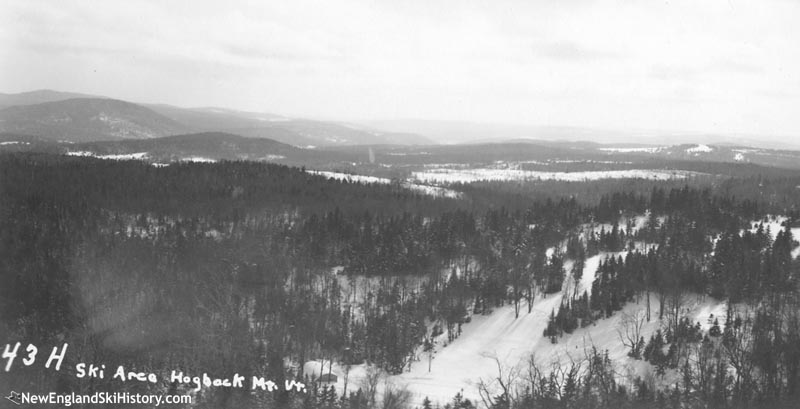
The early years of Hogback Mountain |
The groundwork for the Hogback development dates back to the 1920s, when Harold White became interested in area southwest of Hogback Mountain in West Marlboro.
Circa 1932, the Vermont Division of Forestry reportedly constructed a fire tower on the southwest peak of Hogback Mountain, which was dubbed Mt. Olga after the property owner, Olga Hafslund. Marlboro resident William Pool resigned his seat in the legislator to serve as fire warden starting in 1934.
Plans for a hard-surfaced road from Brattleboro to Bennington emerged in the 1930s, roughly following the route Revolutionary War hero John Stark used to transport a captured cannon. Named after Stark's wife, the million dollar Molly Stark Highway was dedicated by Governor Charles Smith on September 7, 1936, with former Governor Stanley Wilson serving as the day's main speaker.
The focal point of the highway was its highpoint, dubbed the Skyline. Two days prior to the highway's dedication, the Marlboro Tavern debuted there, offering rooms and three meals per day. The development eventually grew to include the Skyline Restaurant, Hogback Mountain Gift Shop, and Marlboro Inn, which remained under the ownership and management of Harold White's children for many decades.
Mt. Olga Ski Trails
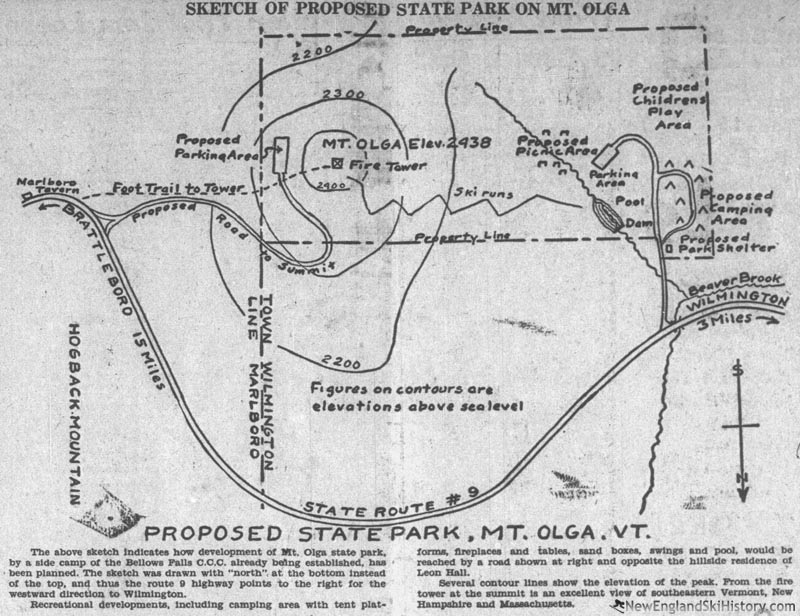
A circa 1940 rendering of Molly Stark Stat Park |
In the fall of 1937, an effort was underway to acquire a tract of land on Mt. Olga from Olga Hafslund to create a state park. A group of residents from Brattleboro, Bennington, and Wilmington pledged to raise a combined $1,500 to purchase the property and subsequently donate it to the state. In conjunction with this effort, assistant state forester Albert Gottlieb surveyed two potential ski trails on the west side of Mt. Olga, running to an uninhabited location referred to as "the old Buck place." The proposed trails were to be novice and intermediate, each 25 feet wide. Though the trails were initially hoped to be cut by the Wilmington CCC, the camp was disbanded, leaving the project to the state. Picnic tables, however, were to be built by the Bellows Falls CCC camp.
Two trails were reportedly cut later in the fall of 1937 under the supervision of Mt. Olga fire warden William Pool. The first skiing on the trails reportedly took place on December 28, 1937. Fundraising for the prospective park subsequently stalled, though the New York Times mentioned a rope tow development for the 1939-40 season.
Planning for the proposed state park continued in 1940, including an auto road to the summit from near the Marlboro Tavern. In August, the state announced the park acquisition would go forward, with $1,000 coming from private donors and the remaining $500 from the state. A group from the Bellows Falls CCC was moved to the new Molly Stark State Forest to begin development.
It is not known if skiing continued on Mt. Olga, particularly with the onset of World War II.
The namesake of Mt. Olga, Olga Hafslund, passed away on January 29, 1944 at the age of 79.
Hogback Opens
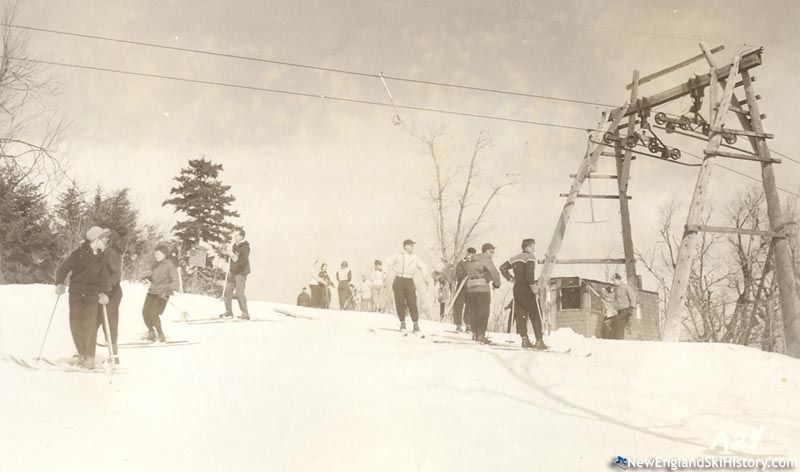
The Sugar T-Bar circa the 1950s |
In April 1946, Hogback Mountain Ski Lift, Inc. was incorporated with a planned capitalization of $50,000. Brattleboro Outing Club members John Dunham, Floyd Messenger, and Leslie "Les" Billings served as the company's President, Treasurer, general manager/ski school director, respectively. Other directors included Harold White, James Negley Cooke (also involved with Mt. Mansfield and the planned Mad River Glen development), future Governor Ernest Gibson, George Mason, Dr. Richard Stevens, Charles Toms, and Nelson Withington. $10 shares of stock were sold in 10-share blocks. Meanwhile, a 10-year lease was signed with property owner Harold White.
Plans for the project emerged in May 1946 as Les Billings started work on clearing trails and the lift line. A 2,310 foot long by 475 foot vertical diesel-powered Constam T-Bar was to be installed by John A. Roebling's Sons Company and Livermore Bailey with an uphill capacity of 900 riders per hour. A base warming hut, complete with toilets, was to be designed by Alan Bartlett. A columnist for the Brattleboro Reformer was critical of the "rather plain name," noting "Hogback Mountain will not attract those who are looking for a descriptive name like Snow Valley or Paradise Peak. But the skier is not attracted by a name."
In June, Hogback Mountain announced it had already raised $40,000 from stock sales. The timing of the new ski area was crucial for Brattleboro skiers, as the lease for the Guilford Street Ski Tow land could not be renewed. Guilford Street Ski Tow equipment reportedly moved to the Bonnyvale area. Meanwhile, Robert MacNeil sold the Marlboro Inn to George Kennings, who planned to provide accommodations to skiers.
The lift line was nearly completed by late August 1946, with only additional blasting still needed. Les Billings' crew was at this point moving on to trail clearing with the hope of having up to six trails ready for the winter. The area was plagued by a strike that delayed the shipment of steel for the haul rope and terminal framework. By mid-November, the wooden lift towers were installed, however the machinery had yet to arrive. 100 people participated in a walking tour of the area later in the month.
Hogback was still awaiting lift equipment as mid-December arrived. The Brattleboro Reformer noted, "the promoters of the Hogback Mountain ski lift development have not yet worried over the current lack of snow, for it has made their construction job that much easier." Snow finally arrived for Christmas Eve, but Hogback remained idle due to the missing lift equipment.
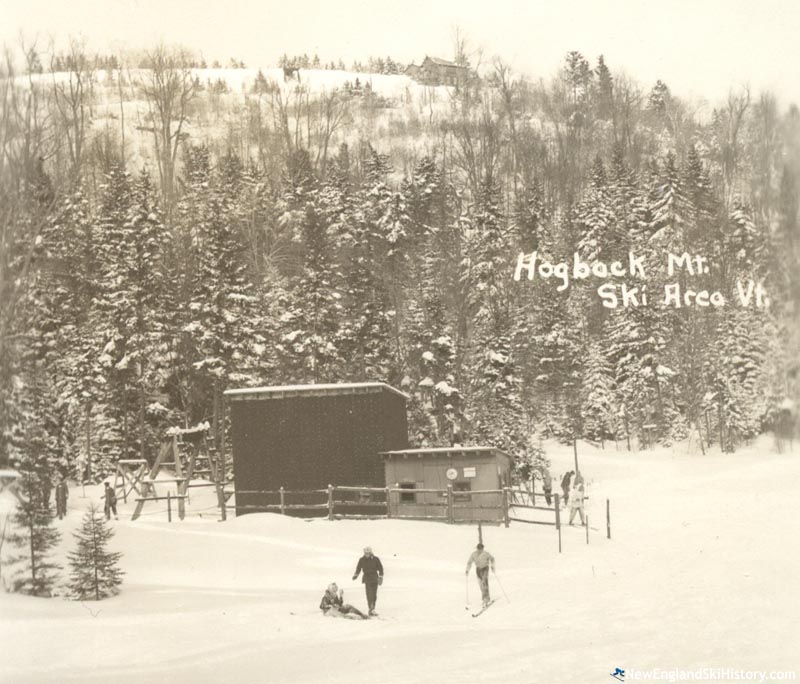
The Hogback base area |
Construction of the lift was slowed as January arrived due to base depths growing to more than two feet. The snowpack survived a January thaw, hanging on as the lift installation wrapped up later in the month. The lift opened on a free basis for about 50 skiers for an hour on January 23, 1947 as final checks were conducted. Hogback formally debuted two days later, featuring five trails ranging from novice to expert. Bus service was provided to and from Brattleboro.
In February, the Swiss ski team trained at Hogback in preparation for an appearance at the Dartmouth Winter Carnival and eventually Olympic tryouts in Sun Valley. The visiting team included captain Arnold Glatthardt, Antoinette Meyer, Olivia Ausoni, Rosemarie Bleuer, Edi Rominger, Karl Molitor, and (future Cannon Mountain ski school director) Paul Valar. According to the Brattleboro Reformer, locals "watched aghast as the champions flung themselves with breath-taking speed and grace down the slopes of Hogback. From 11 a. m. to 4 p. m., with an hour out for lunch, they explored every trail, discovering from themselves several variations beside those already broken out. All agreed the skiing conditions were excellent, though two sustained breaks on the rear ends of their skis."
Operations were suspended for multiple days in late February into early March when the top of one of the lift towers broke off. Two to three feet of base persisted into spring with the season lasting until heavy, warm rain washed out the snow in early April.
Hogback Mountain Ski Lift, Inc. reported a "small operating profit before depreciation" for the inaugural season. Plans were announced to more than double the width of existing trails, as well as cut new ones. Off-season logging kicked off in June with Les Billings and Clinton Howe leading the crew. In addition to widening existing trails, the crew cut the intermediate Ripperoo trail adjacent to the T-Bar. Roebling reportedly returned to safety devices to the lift and overhaul the spring boxes. A rope tow was constructed on a practice slope on the Route 9 side of the area. Plans were also made to pour a concrete floor in the Quonset hut at the base of the mountain, with Harold White preparing to serve food and hot drinks.
To boost youth skiing in the region, Hogback offered free use of the area for Brattleboro High School ski team practices for the 1947-48 season.
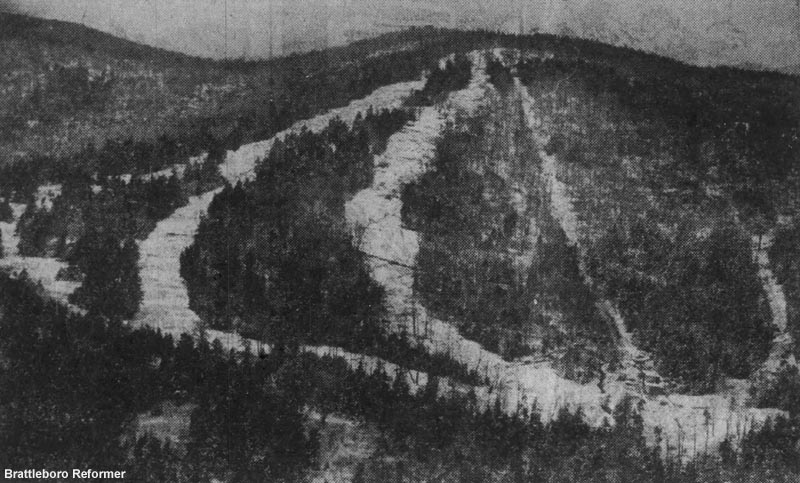
Hogback in December 1947 |
The 1947-48 season launched after Christmas, following a storm that dumped the first significant snow of the winter just before Christmas Eve. The area experienced grip or spring problems with the T-Bar, as the Brattleboro Reformer reported, "So many of them broke that the lift ran at low capacity both Saturday and Sunday" of the weekend following Christmas.
Lift woes struck again on New Year's Eve, when a T jammed into the top terminal, forcing those stranded at the bottom of the ski area to hike up to Route 9. The subsequent multi-day repair operation further delayed the debut of the new rope tow. The situation improved as the month progressed, with the area attracting 400 visitors on a mid-January Sunday. Olympian Elizabeth Woolsey visited Hogback around this time.
Nearby Bonnyvale ski area shut down in early March, citing that areas such as Hogback were pulling away skiers and thus rendering it unprofitable. The rope tow area dated back to at least the winter of 1941-42. Meanwhile, Hogback reportedly had a record crowd on the first Sunday of March. Spring arrived early, resulting in major flooding in the region. The season came to a close after the first full weekend of calendar spring amidst "a flock of bare spots," according to the Rutland Daily Herald.
The 1947-48 season was reportedly successful for the company, though no subsequent major capital improvements were planned. Joe Ritter's High Mountain Ski School was signed to operate the Hogback ski school, while manager Les Billings departed for a job at Bear Mountain, New York. Tino Koch was hired as Ritter's Hogback ski school director, while Holland Douglas and Walter Harrington were put in charge of the lift and trails.
Improvements for the 1948-49 season included extending the rope tow uphill toward the top of the T-Bar, cutting the Sugar Slope, and adding the Cut-Off trail to connect the two. A new parking area may have been constructed. Though there had been talk of expanding onto the South Face, the project never came to fruition.
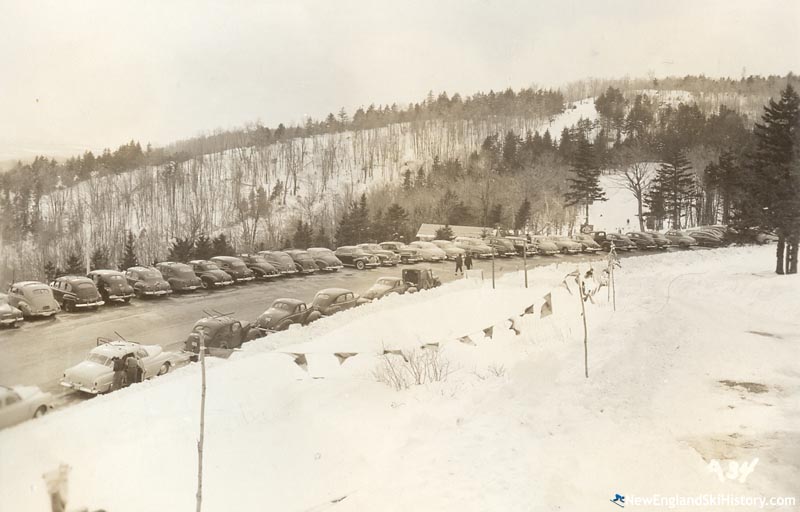
Early parking at Hogback |
The 1948-49 season was late to start. When Swiss newcomer Tito Koch arrived in December, he was quoted by the Bennington Banner as asking, "Where is your snow?" The paper noted in mid-January, "We shall always have this shortage some winters in Vermont, which leads some of the natives to fear that our winter sports resorts built by newcomers from the cities may be located too far south. The Mansfield region around Stowe always has snow for two or three months, but there are other regions where the snowfall is not so certain." The season finally started at the end of January, with 325 people hitting the slopes over the weekend.
February 1949 started strong, as Hogback saw a record crowd of 600 on the first Sunday. A 90-horsepower motor may have been installed to improve performance of the rope tow around this time. Warm, rainy weather ruined the Washington's Birthday holiday period, with the Brattleboro Reformer opining, "Skiing in Windham County looked like a dead duck." Hogback saw strong crowds despite poor conditions later in the month, when it had the only skiing around. Mild weather in March melted out the season at the end of calendar winter.
The poor weather and conditions resulted in revenue reportedly dropping by 50% in 1948-49, resulting in a loss. Plans were made to widen and smooth the Rim Run trail, as it often suffered from heavy use. The former ski shop building was moved to the top of the T-Bar to serve as a ski patrol building, with plans made to build a larger retail facility.
While working on the mountain in early November, Walter Harrington was reportedly attacked by a bobcat. The bobcat jumped out of a tree, landing on Harrington and seriously scratching his face and arm. Medical attention was required for the incident, which was front page news.
Hogback's agreement with Joe Ritter's High Mountain Ski School was terminated, however Tino Koch returned to independently run the ski school. In addition to overhauling Rim Run, the Tower Trail and the novice slope were also improved for the 1949-50 season.
An early snowstorm allowed Hogback to open the rope tow for two days in mid-December. Rain and a subsequent lack of snow put an end to skiing until mid-February.
After half a decade of operation, the ski area reportedly turned its first annual profit with the 1951-52 season. Around this time, a late-season costume party became an annual tradition.
Expansion on the Route 9 Side
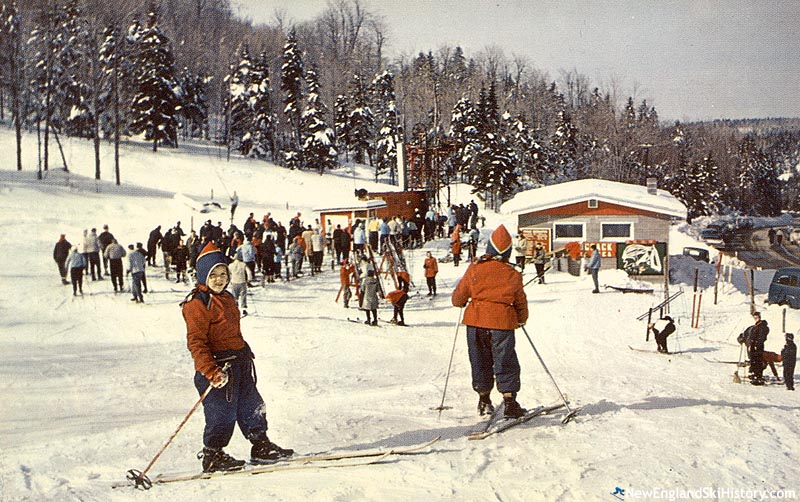
The Whiteway Pomalift |
The 1954-55 season was Hogback's most successful to date, as the rope tow started operating in late November. Meanwhile, a new ski area opened nearby at Mt. Snow.
Following the season, Hogback acquired land to the northwest of the existing ski area for an expansion. Workers were hampered by rain as they rushed to cut Great White Way and Molly Stark, resulting in rough skiing until they could finish excavation during the following off-season. The diesel-powered Whiteway Pomalift didn't arrive until later in the fall, which, coupled with poor snowfall, resulted in the lift not opening until early February. Nevertheless, the new trails and lift gave Hogback additional visibility from Route 9 and increased its vertical drop by 50 feet. Even with the late start, the 1955-56 season was one of Hogback's best, as the area operated for 74 days. A thousand skiers would hit the slopes on a good day.
Another attraction was added in 1957, when White acquired taxidermist Luman Nelson's bird museum. The collection became the core of the Nelson Museum of New England Wildlife, which reportedly featured 500 bird and animal specimens. The museum was reportedly the third largest of its type in the country.
The adjacent Molly Stark State Park was developed starting in 1959, when Governor Robert Stafford approved $146,200 for the construction of an access road for a campground development.
The Roaring Sixties
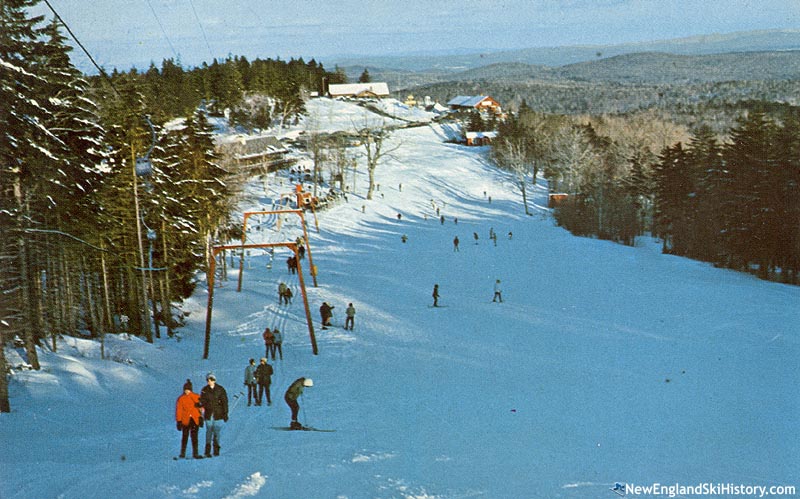
Looking down the Practice Slope circa the 1960s |
After years of having skiers cross the highway to get food, work commenced on a new lodge in 1960. Named the Alpenglo Lodge, the new structure was completed for the 1961-62 season. Located at the base of the Practice Slope, the facility had a cafeteria, restrooms, and a large fireplace.
1961 also marked the release of "Instant Skiing on Short, Short Skis" by Hogback ski instructor and 10th Mountain Division veteran Clifton Taylor. Featuring a foreword by Lowell Thomas, the book helped to create national exposure for the innovative skis and instruction developed at Hogback. The concept became known as the Graduated Length Method and led to Clif Taylor being elected to the Ski Hall of Fame.
After experiencing mechanical issues during the 1961-62 season, the original T-Bar was improved for the 1962-63 season, as the 75 HP diesel motor was replaced with a new 100 HP unit.
The practice slope tow was rebuilt with a new diesel engine and rope for the 1963-64 season. The Alpenglo Lodge was also expanded, as it was advertised as "a sensational hit with skiers" including "snow bunnies, novices, and racers alike." A skating rink was constructed adjacent to the lodge.
Hogback's next significant expansion took place for 1964-65, when two electric T-Bars were installed. A twin T-Bar was added to the original part of the ski area, taking some stress off the aging Constam T-Bar. The Alpenglo T-Bar was constructed between the original ski area and the Poma lift served complex, replacing the recently rebuilt rope tow (which in turn replaced the rope tow near the Pomalift) near the newly renovated Skyline Restaurant. A new intermediate trail named Olga was cleared beyond Molly Stark. For the sixth time in the past ten seasons, Hogback turned a profit. A survey of ski areas through 1965 indicated that Hogback had a higher profit margin than Killington, Stowe, Stratton, and Sugarbush during this multi-year period.
Luman Nelson passed away in November 1966 at the age of 92.
Further lift maintenance took place for the 1967-68 season, as some of the original wooden T-Bar towers were replaced and the Pomalift upgraded. As a sign of the times, a Hogback newsletter noted, "It makes us feel kind of old when we look around us and see what's happening on the ski scene." Skiers were happy to see the same staff year after year, including manager Holland Douglas and ski school director Jim Howard.
The Whiteway Poma was replaced with a new T-Bar for the 1969-70 season, further increasing uphill capacity on that side of the mountain. Fully built out, Hogback sported 50 acres of skiable terrain.
On the evening of December 29, 1970, the base terminal of the original Sugar T-Bar caught fire, resulting in a total loss. Firefighters were able to prevent the fire from engulfing the nearby Meadow T-Bar. Though the electric distribution lines were also damaged, the Meadow T-Bar was back in operation later in the week, restoring access to the main mountain.
The charred Sugar T-Bar base terminal was replaced with a new Doppelmayr drive for the 1971-72 season. With large areas such as Mount Snow and Stratton rapidly growing, Hogback attempted to differentiate itself by using the slogan the "biggest little area in New England."
Hogback reportedly came under new ownership and management for the 1976-77 season.
In the fall of 1978, the sale of Hogback to Texas attorney Thomas Barlow was announced. Plans were announced to install a large snowmaking system for the following season, however the project and sale did not come to fruition. Arnold White remained on board as General Manager.
The 1980s
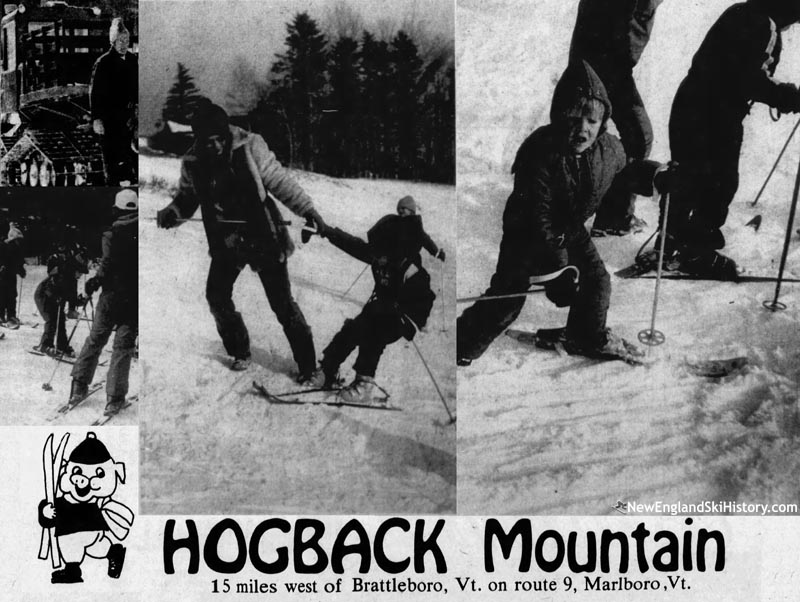
The early 1980s at Hogback |
The rising cost of insurance was cited as the reason for price increases for the 1979-80 season. A lack of natural snow likely limited operations to just a few days between January and March.
Hogback was able to open before Christmas for the 1980-81 season, but quickly saw the emergence of bare spots during the holiday week. Despite lackluster snowfall, Hogback managed to operate until late March. Nevertheless, Arnold White told the Brattleboro Reformer that the season was "disastrous" and that the Skyline Restaurant and gift shop were the main businesses at this point. With nearby areas such as Haystack, Maple Valley, and Timber Ridge on the verge of failure, there were rumors that Hogback would shut down if the next winter was also poor.
Multiple modest early December snowfalls allowed Hogback to start the 1981-82 season in the middle of the month, leading Arnold white to declare, "I've been praying for this. You don't know what this means to a small operation." The Christmas to New Year's holiday week was the largest in Hogback's history, leaving Arnold to proclaim, "We've never seen anything like it."
Meanwhile, the Hogback Mountain Ski School put on a number of special events, including a Valentine's Day Fun Race, in which couples were required to ski "hand-in-hand through a gentle slalom course" with "your finale kiss rated on a scale of 1 to 10" and a grand prize of dinner at the Skyline Restaurant. Two weeks later, Hogback hosed a "Waiter, Waitress & Bartender's Race" in which the contestants had to prepare a drink or bowl of soup halfway down the slalom course, then ski it down to the bottom and serve it to a judge as quickly and steadily as possible.
In March 1982, Arnold White announced the 560-acre ski area and tourist attraction was on the market for $2.7 million. At the time, the 59-year-old White and his wife Ruth reportedly owned the area with White's sisters and their husbands, Joyce and Richard Hamilton and Betsy and Brandon Douglas.
In May, Hogback made the papers as the unwitting backdrop for a Ku Klux Klan appearance. A group of Klansmen from Connecticut stopped at the ski area, posed for photos, and drew some shouts in protest from passersby.
The 1982-83 season was yet another slow start at Hogback, missing Christmas due to warm weather. Arnold White told the Brattleboro Reformer, "There's not enough snow to make a snowball - it's a bummer." Measurable snow finally fell in mid-January. Heavy rains in early March likely resulted in the season coming to an end before the arrival of spring.
In October, scenic foliage helicopter rides were offered starting at the Hogback parking lot, boosting traffic to the various attractions.
Part-owner Brandon Douglas passed away on December 13, 1983 at the age of 69.
The 1983-84 season started the day after Christmas, but snowfall was not initially plentiful. Local ski coaches complained about not being able to have quality practices due to the lack of snowmaking, resulting in their racers not skiing gates until their first meets at other areas; Brattleboro's teams would move to Mt. Snow one year later. A mid-January storm improved base depths.
To try to attract midweek business during the 1983-84 season, Hogback offered a $10 lift ticket with breakfast from the Skyline Restaurant.
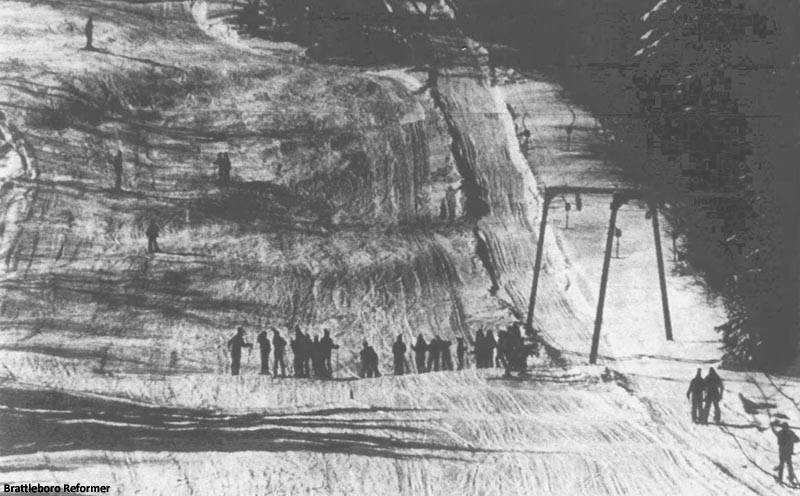
The Practice Slope in January 1984 |
February 1984 was not kind to Hogback, as warm, wet weather shut down the ski area during Washington's Birthday week. Arnold White told the Brattleboro Reformer that he needed to either install snowmaking or get out of the ski business, adding, "It will be a sad day when the moderate income families have to give up the sport because they can't afford the $70 to $100 a day that the bigger mountains charge."
A six-inch storm reopened the area at the start of March. A larger storm in the middle of the month extended the season through the last weekend of March. That month, Bruce Cole wrote a letter on behalf of Marlboro School, thanking Dick Hamilton and Arnold White for free skiing at Hogback, telling Brattleboro Reformer readers, "Marlboro School may not have a gym but we certainly have a unique experience for eight Monday afternoons every winter at no cost to any of the participants."
The 1984-85 season started just after Christmas, but shut down before the holiday weekend due to record high temperatures and rain. The area likely missed the entire month of January due to lack of snow. The season likely came to a close after the second weekend in March.
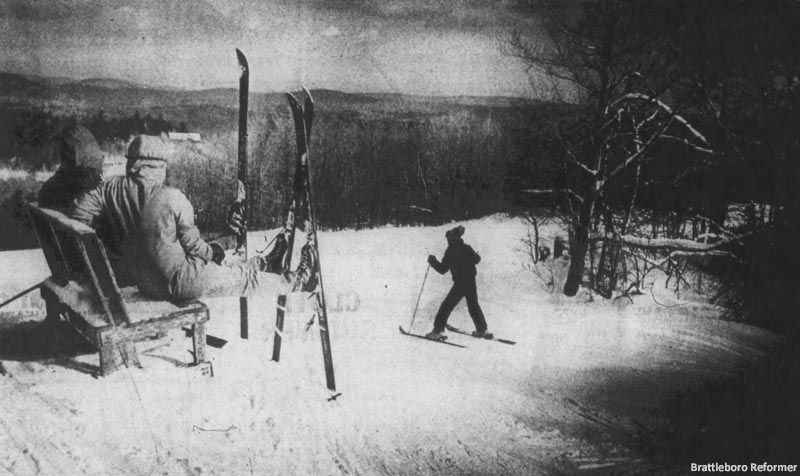
The final January of skiing at Hogback (1986) |
The 1985-86 season started before Christmas and reportedly had a good holiday week. The season reportedly chugged along well until a January thaw suspended operations late in the month until the start of February. The season likely came to an end after the first weekend of calendar spring.
Off-season maintenance took place in 1986, but a crisis was brewing. In June, Hogback was notified that its insurance premium would more than double. Hogback attempted to contact Governor Madeleine Kunin's assistance hotline to sound the alarm, but soon hit a dead-end with the Department of Banking and Insurance.
Closure
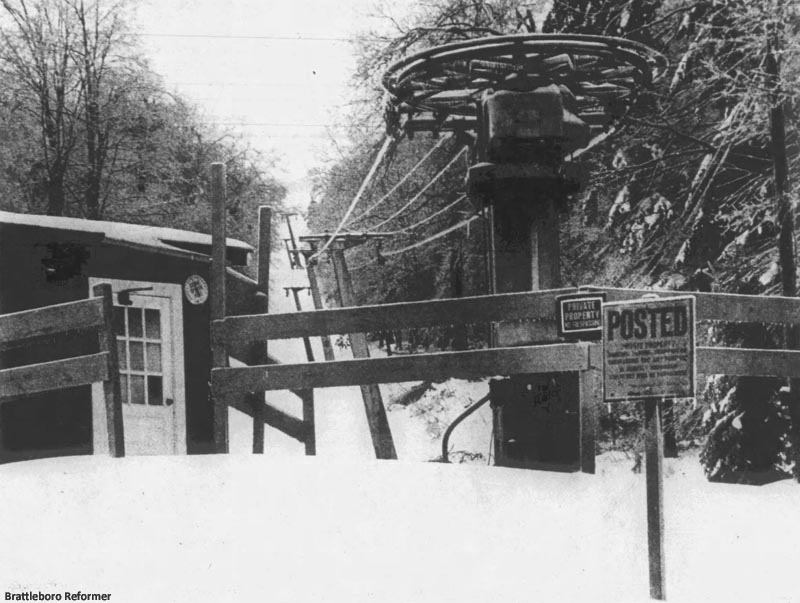
An idle Hogback (November 1986) |
In October 1986, Hogback announced it would not be opening due to insurance costs. The restaurant and gift shop would remain open. Hogback's accountant told the Rutland Herald that the ski insurance was quoted at $50,000, as compared to 1985-86 total revenue of $70,000 (the area lost $40,000)
. Arnold White made the decision that he could not risk paying the $50,000 premium if there was no natural snow, as "We could take an awful financial beating." White blamed the state government for the woes, stating, "The deadbeat Legislature has got to do something about it. We need to get rid of the lawyers and get pro-business people and farmers who are conservative and smart monetarily. This is just a big game for the insurance people and lawyers."
The ski area and related properties remained for sale, with an asking price of $3 million for the 720 acre complex. White may have acquired additional acreage around this time. A few days after the closure announcement, an insurance company in Rhode Island made headlines when it said it would offer Hogback a lower premium. However, the company never provided a formal offer, resulting in Hogback formally pulling the plug at the end of October. Rental shop inventory was subsequently placed on the market.
Hogback was not the only local area hurt by the cost of insurance. Brattleboro's Living Memorial Park also shut down during the winter of 1986-87 due to the spiraling expense.
With the ski area now posted with No Trespassing signs, the slopes sat idle as natural snow accumulated during the winter of 1986-87. The ski lodge hosted church services on Sunday mornings.
In July 1987, Clayton Wetmore and his sons Andrew and Paul of Wetmore Associates in Massachusetts presented plans to the Marlboro Planning Commission to develop a four-season resort at Hogback. The group, which had obtained an option on the Hogback property in the spring of 1987, planned to construct a chairlift, snowmaking equipment, a golf course, an equestrian center, a three-story hotel and convention center, and 200 to 450 housing units over 15 years. Clayton told the commission that he had owned an international chemical and manufacturing company and that, though the family had never developed property before, it owned a condominium at Mt. Snow. Cavendish Partnership of Ludlow was hired as a land use planner. Clayton Wetmore's brother Claude moved into a cabin on the property to be involved with day-to-day activities.
A planning commission meeting in late July 1987 saw local pushback to the plans. Arnold White addressed the crowd briefly, stating, "The only reason we came here to Marlboro, was I thought we were doing the right thing...I expect to live here the rest of my life, God willing...We want to see it done right. It's something we wanted to do ourselves, but we're at that age of retirement and all I can say is we thought we were doing it right by bringing it here before the town. But the next time it may get sold. We won't be back. It'll be gone."
Soon after the local opposition emerged, Wetmore Associates listed Hogback for sale for $3.5 million, much to the surprise of the Hamilton and White families. Andrew Wetmore told the Brattleboro Reformer that the advertisement was placed to gather feedback on the value of the property and to seek potential investors.
Claude Wetmore died away suddenly, putting further pressure on the project. In November 1987, Arnold White announced Hogback would be closed during the winter of 1987-88, regardless of whether or not the Wetmores exercised their option. Wetmore Associates quietly dropped their Hogback plans.
In the spring
of 1989, there was an effort underway in Marlboro to obtain a grant to purchase Hogback. Various local conservation efforts continued into the 1990s.
Hogback Ski Area, Inc. was formally dissolved in 1992.
Hogback Heads to the Block
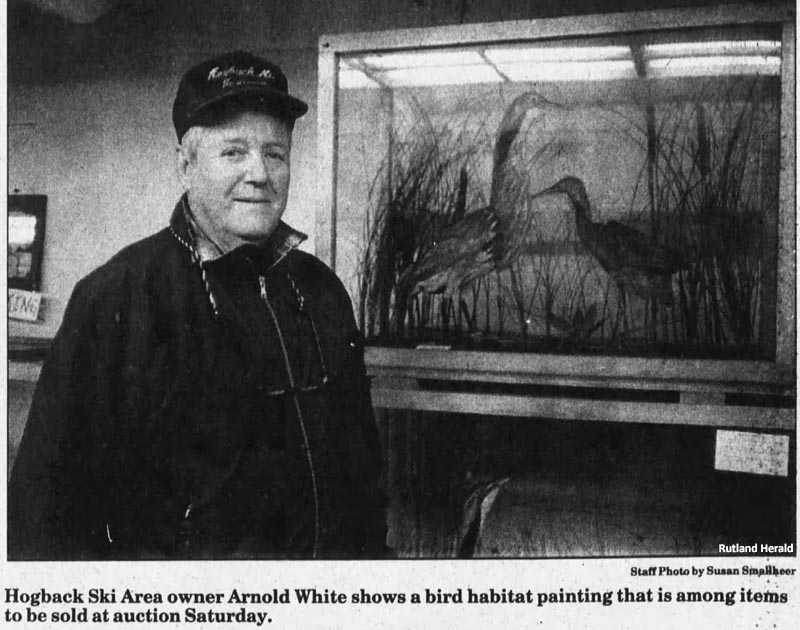
Owner Arnold White on the eve of the auction (October 1993) |
While the Hamilton and White families had kept the Skyline Restaurant and Hogback Mountain Gift Shop in operation since the closing of the ski area, they were ready to retire. An auction was announced in September 1993. Richard Hamilton told the Brattleboro Reformer, "This has turned out to be our life's work, and my age now is 71. We have had the place for sale for a number of years, and it's come to this."
Hogback headed to the block on October 23, 1993, conducted by Deppoliti's Northeast Auction & Realty. Dan Purjes, CEO of brokerage firm Josephthal, Lyon, and Ross, placed the winning bid of $1,870,540 for the 802-acre property (except for the Luman Ranger Nelson Museum collection, which was retained by the Hamilton and White families). Purjes told the Rutland Herald, "I love Vermont. I tried to buy this 21 years ago. I didn't even know I would be in Vermont this weekend, and I haven't even told my wife."
Former ski school director Jim Howard passed away at the age of 78 on the day of the auction.
Two years prior to the acquisition, Purjes had acquired Coombs Maple Products. Following the Hogback acquisition, the Skyline Restaurant and Hogback Mountain Gift Shop were initially managed by Arnold Coombs.
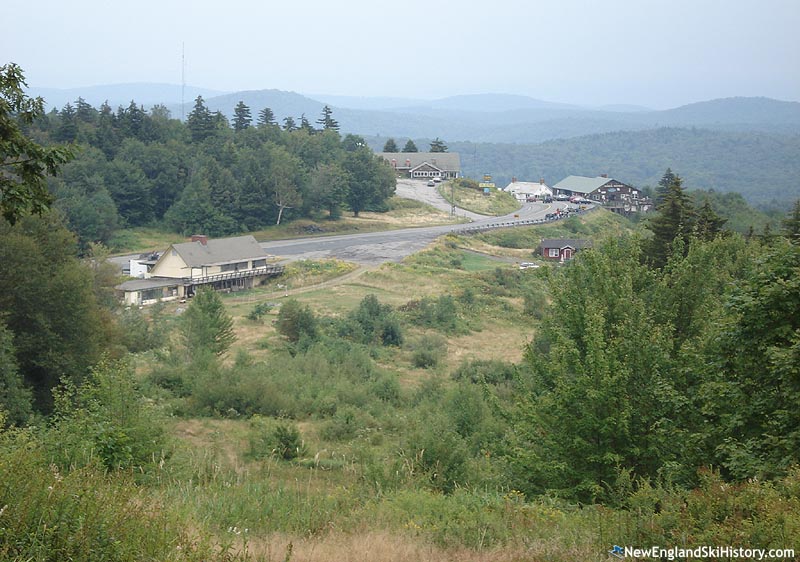
Looking down the Practice Slope in 2006 |
The Living History Museum opened in the former ski lodge in July 1995, featuring items from the Revolutionary War through World War II. In addition to operating the museum, the Living History Association also conducted reenactments on the property.
In the late 1990s, the then-owners of Ascutney attempted to form a corporation that would have reopened Hogback, however the planned IPO was unsuccessful.
Hogback Mountain Conservation Area
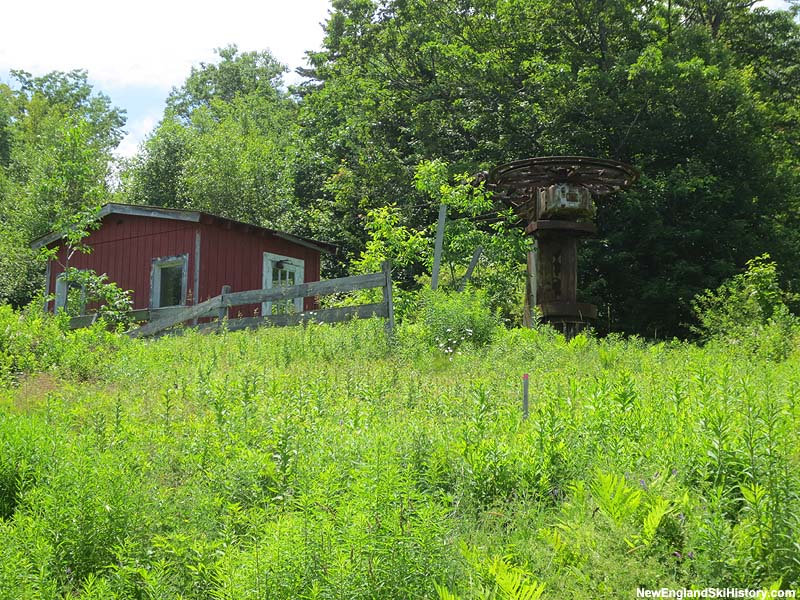
The Whiteway T-Bar (2013) |
In 2006, the Hogback Mountain Conservation Association was formed by local citizens with the intention of saving the land from development. After a multi-year fundraising effort, much of the land was handed over to the Vermont Land Trust, Vermont Housing and Conservation Board, and the Town of Marlboro in 2010. Some trails are now maintained for hiking and backcountry skiing, as well as access to the nearby Mt. Olga fire tower in Molly Stark State Park. The Hogback Mountain Gift Shop remains open, while the Marlboro Inn is now home to the Luman Nelson collection at the Southern Vermont Natural History Museum.
NewEnglandSkiIndustry.com News
Expansion History
| Project |
Season |
 | Whiteway
Abandoned | 1955-56 | |  | South Face
Cancelled | 1940s | |
Image Gallery
Lifts
Click on lift name for information and photos
Maps
Year by Year History
Adult Weekend Full Day Lift Ticket; Adult Full Price Unlimited Season Pass. Window price, including RFID fee and taxes when known.
| 1980s |
Ticket Price |
Season Pass Price |
Pass Payback |
Opening Day |
Closing Day |
Skier Visits |
| 1985-86 | |  | |  | | December 20 | March 23 | |  | | | 1984-85 | $15.00 |  | $165.00 |  | 11.0 days | | | |  | | | 1983-84 | $14.00 |  | $165.00 |  | 11.8 days | December 26 | | |  | | | 1982-83 | $14.00 |  | $165.00 |  | 11.8 days | January 17 | March 20 | |  | | | 1981-82 | |  | $150.00 |  | | December 17 | April 4 | |  | | | 1980-81 | $10.00 |  | $135.00 |  | 13.5 days | December 20 | | |  | | | 1979-80 | $9.75 |  | $125.00 |  | 12.8 days | | | |  | |
| 1970s |
Ticket Price |
Season Pass Price |
Pass Payback |
Opening Day |
Closing Day |
Skier Visits |
| 1978-79 | $7.95 |  | |  | | | | |  | | | 1977-78 | $7.50 |  | $100.00 |  | 13.3 days | December 10 | | |  | | | 1976-77 | $7.00 |  | |  | | January 8 | | |  | | | 1975-76 | $7.00 |  | |  | | | | |  | | | 1974-75 | $7.00 |  | $90.00 |  | 12.9 days | | | |  | | | 1973-74 | $7.00 |  | |  | | | | |  | | | 1972-73 | $6.00 |  | |  | | December 2 | | |  | | | 1971-72 | $6.00 |  | $75.00 |  | 12.5 days | December 4 | | |  | | | 1970-71 | $6.00 |  | $75.00 |  | 12.5 days | December 17 | | |  | | | 1969-70 | $6.00 |  | $75.00 |  | 12.5 days | | | |  | |
| 1960s |
Ticket Price |
Season Pass Price |
Pass Payback |
Opening Day |
Closing Day |
Skier Visits |
| 1968-69 | $5.00 |  | $65.00 |  | 13.0 days | November 10 | April 9 | |  | | | 1967-68 | $5.00 |  | $60.00 |  | 12.0 days | | | |  | | | 1966-67 | $5.00 |  | $60.00 |  | 12.0 days | | April 2 | |  | | | 1965-66 | $4.00 |  | |  | | | | |  | | | 1964-65 | $4.00 |  | $40.00 |  | 10.0 days | | April 11 | |  | | | 1963-64 | $4.00 |  | |  | | | April 5 | |  | | | 1962-63 | $4.00 |  | |  | | December 15 | | |  | | | 1961-62 | $4.00 |  | |  | | December 22 | April 8 | |  | | | 1960-61 | $4.00 |  | |  | | December 17 | April 2 | |  | | | 1959-60 | $3.00 |  | |  | | | | |  | |
| 1950s |
Ticket Price |
Season Pass Price |
Pass Payback |
Opening Day |
Closing Day |
Skier Visits |
| 1958-59 | $4.00 |  | |  | | December 6 | | |  | | | 1957-58 | |  | |  | | January 9 | April 20 | |  | | | 1956-57 | |  | |  | | December 15 | | |  | | | 1955-56 | $3.50 |  | |  | | January 5 | April 15 | 11,646 |  | | | 1954-55 | |  | |  | | November 28 | April 10 | |  | | | 1951-52 | |  | |  | | | | 12,683 |  | | | 1949-50 | |  | |  | | December 10 | | |  | |
| 1940s |
Ticket Price |
Season Pass Price |
Pass Payback |
Opening Day |
Closing Day |
Skier Visits |
| 1948-49 | $3.00 |  | |  | | January 29 | March 20 | |  | | | 1947-48 | $3.00 |  | |  | | December 26 | March 28 | |  | | | 1946-47 | $3.00 |  | |  | | January 23 | April 6 | |  | |
Visitor Memories
| "This is where I learned to ski starting at age 4 around 1958. Our family came up from Long Island and stayed with friends in Brattelboro on weekends. I have some of the best childhood memories of Hogback.
" | | Michael Ross, Feb. 13, 2025 | | "I was blessed to grow up in the 50's and 60's when Hogback was operated by the enthusiastic, adventurous White family and some local benefactors. I learned to ski there, made new friends from all over New Engalnd there and learned to enjoy being outdoors challenging all elements. My gloves might wet through and my pants sure weren't waterproof but I didn't want the lifts to shut down at 4 PM. We might pack out the new snowfall with the Brattleboro Outing Club at 9 AM, have soup for lunch at Skyine, and look forward to Riperoo Standard Races, top to bottom with no gates to slow you down, on Saturday. Many of us have Hogback and the White family to thank for starting a lifetime of dedication to outdoor fun and skiing. We were so fortunate." | | David Neumeister, Jan. 4, 2025 | | "My Mom & Dad (Lillian Usher Hill & Clifford Gregory Hill)owned the Marlboro Inn from 1947 to 1949/1950
As a boy (10/11 years old) I learned to ski on Hogback Mountain.
Every weekend I would bother Dad for lift tickets (probably $1.00 or $2.00).
Many great memories.
" | | John Hill, Dec. 2, 2024 | | "grew up skiing at Hogback. Great memories. Still dream about it now and then. All the family areas are now history." | | Bob Bennert, Oct. 13, 2023 | | "Skied there in mid 60's a two hour drive from Haverhill, Ma Skied ine day in the fog and mist with a plastic trash bag cut out for head and hands... supplied by the mountain" | | hal Curette, Dec. 26, 2021 | | "My dad was on the ski patrol there for years. Skied there from the early 60's til its closing. Even loaded t bars 1 season. Lot's of great times!" | | J P Switzer, Jun. 18, 2021 | | "Stonington Ct Community Center had a ski club from 1964 to 68. Our ski trips were always to Hogback where we all stayed at the Marlborough Inn and ate at the Skyline Restaurant. What fun we had. It was safe and perfect for a group of kids. " | | CHRISTINE LOPEZ, Jan. 4, 2021 | | "i worked at haystack mtn and dated a guy who was the son of the owner and ski instructor beautiful memories indeed
sandra" | | Sandra williams, Jul. 10, 2020 | | "I skied Hogback every Friday for free as a kid in Marlboro Elementary School. The way I remember it Arnold White gave us all free passes (2nd half of the day), free equipment, and a free hot chocolate every Friday. What an amazing gift! I don't remember if it was the whole school or just certain grades. The Riperoo, Great White Way, Meadow...I had so much fun there, thanks Arnold!" | | Carl Gay, Jun. 30, 2020 | | "Unfortunately I never had the chance to ski here when it was operational, and only discovered this area by accident on a trip down Rt 9 back in 1999 or 2000 which is probably how I discovered NELSAP too! Finally had the chance to explore it on Tuesday 5/26/20. Pretty much was able to hike and explore most of the area in about an hour. What a time capsule! Beautiful area and its a shame it closed because I can tell it had some very fun skiable terrain. Trails still seem pretty clear for XC and backcountry skiing. I'll have to give backcountry a try at this area next season. " | | Geoff Prusak, May. 28, 2020 | | "Racing SL in the Buuddy Warner League on Olga...1984, i still have my medals! I did tuck the Sugar, and i did get stuck in "the hole" after last run, as my sister Noelle mentioned. Some of the best memories of my life are on those 12 trails. Thank you Arnold White, and Mom and dad Jim and Paulette Hart. " | | Rich Hart, Apr. 12, 2020 | | "in my 20s i had one day of skiing with two friends. it was a frigid day i never forgot. at the end of the day 0 degree temp and 5 inches of fluffy snow to my shock i had a flat tire on my 1963 cadillac . hogback mountain if on my bucket list now just to walk the trail and see what i did 50 years ago. my two friends now dead. bob walton and steve irving/ " | | donald thiederman, Nov. 20, 2019 | | "I learned many life lessons at Hogback. I worked there many years in the gift shop and the ski shop. Summers I’d ride my horse up the ski trails. Was the best place to grow up. Sure miss it there. " | | Christina Havreluk Worker, Apr. 29, 2018 | | "I loved skiing at Hogback as a kid!! West Halifax used to have a ski day every week at the mountain. Living on Shearer Hill Rd, my parents would drop us off on Grant Rd and we'd have to ski in thru the woods. I remember some amazing skiing on Razorback after a big snow storm! Great memories on that mountain! " | | Bill Pusey, Oct. 4, 2016 | | "Skiied Hogback as a child! Loved every minute! From buddy warner, to cutting way out and having lunch off Meadow run, my brother missing last T out of "the hole" having to hike out! Such great childhood memories. Went back around 1994. Some dam kids had been partying and throwing T-bars thru some of the old posters and decore, shame. So glad to hear it is getting the respect it deserves! It is hard for many kids to say we skied down hill and up!" | | noelle hart, wainright , Oct. 2, 2016 | | "I grew up skiing and working at Hogback. I worked in the ski shop and the gift shop. My mom was the bookkeeper for Arnold. Was a great place! " | | Lori Havreluk Longo, Oct. 2, 2016 | | "We skied at Hogback a few times in the mid-late 60s. Most of our Vermont skiing was a Maple Valley, Haystack, Mt. Snow and Okemo. Hogback was a good beginner area. I remember taking my cousins there when they were just learning. It was a novelty to have the base at the summit. I think the last time I skied there was 1969 with a high school ski club outing. Good little area! " | | Doug Finck, Oct. 2, 2016 | | "I skied at Hogback in the late 50's the 60's. Took the BOC Bus on Saturday from the Paramount Theater. I was also on ski patrol at Hogback in the 60's. Lots of great memories." | | Terry Amidon, Jan. 26, 2016 | | "I skied there a few memorable times my Mom and Dad were great friends with the Whites. I love small ski areas and wish they could continue." | | Jan Sherman , Jan. 25, 2016 | | "I skied Hogback all through the 1950's and into the 1960's. Every Saturday and sometimes Sunday's there was a Brattleboro Outing Club free bus that took all of us kids up the mountain for a day of "free" skiing. We had to pack the slopes when we got there if there had been snow, but oh the fun! The Rip and the Sugar were favorite trails, but they were all fun with friends and even girl friends later on. At the end of the day we climbed the slopes and came down on 'jackjumpers' with the crews. Best skiing of my life!" | | Dave Hopkins, Mar. 2, 2014 | | "I skied at Hogback from '72 until '80 (I was age 8-16). It was a wonderful place for my family to go to and we would visit it 3-4 times a year from Philadelphia. Thurs/Fri and Mondays, we would ski Mt. Snow or Stratton, but on the weekends it was Hogback. In the picture looking down the practice slope, you can see a small reddish cabin in the right center of the photo. That is where our family used to stay as we were friends with the family that rented it for years. Such very fond memories of skiing there. Favorite trail without a doubt-- Ripperoo!" | | Glenn Barrie, Feb. 21, 2014 |
|
External Links
Hogback Mountain - New England Lost Ski Areas Project
Hogback Mountain Conservation Association
Mt. Olga - FranklinSites.com Hiking Guide
|
Last updated: November 12, 2024
|



